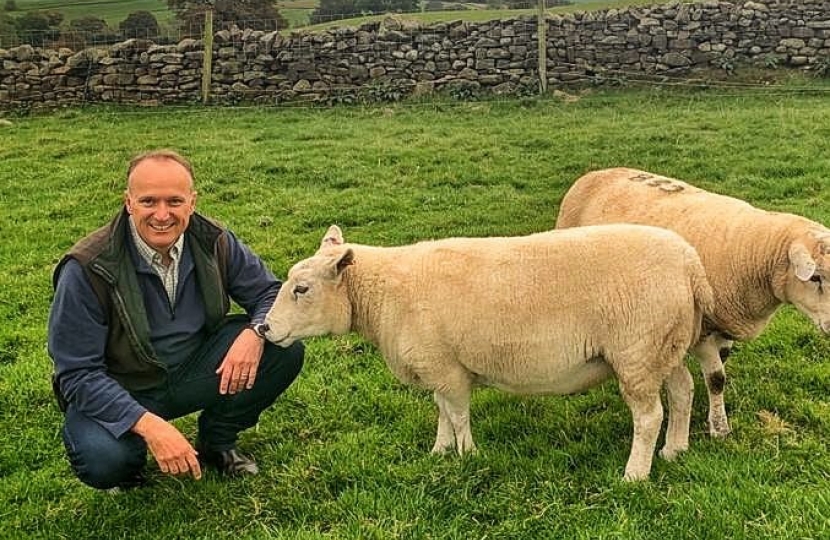
It is now 20 years since the Foot and Mouth Disease (FMD) crisis of 2001. There are certainly some parallels that can be drawn between it and the current Coronavirus pandemic. FMD is an animal disease and Covid is a human disease and public health crisis. Both viruses caused outbreaks that shut down sectors of society and the economy, and both had the same result of putting the country on a ‘war footing’.
I spent a period as a Temporary Veterinary Inspector during FMD and had to supervise large-scale culls on farms, a chastening experience for any vet. It was my experiences during FMD that encouraged me to embark on my journey into politics to use my background in public service, becoming the only vet in the House of Commons. We all remember the dreadful scenes from that crisis, scenes that we hope are never repeated. For me, supervising the culls of many animals is sadly emblazoned in my memory. I vividly remember like it was yesterday being on one farm with a vet colleague and we had supervised the cull of their entire herd of cattle, including the calves, working through the night with logistical support from the army. The farmer invited us into their home for breakfast in the morning. The farmer said “this is the first time I have woken up and I cannot hear anything at all on my farm”. That had a huge impact on me. It was the impact on their personal environment, their home and their livelihoods that stuck with me.
Nationally, over 6 million animals were slaughtered. Cumbria was hit especially hard with over one and a quarter million animals lost. 45% of Cumbria’s farms were subject to culls and in the north, this rose to 70%. The crisis had severe effects on agriculture and the wider economy like tourism and hospitality, but also on the mental health and welfare of the people that live and work in this area.
Cumbrians are therefore very resilient and have faced the challenges of traumas like FMD, Coronavirus and frequent flooding with the same indomitable spirit. They understand that in the throes of such crises it is sometimes necessary to make sacrifices for the greater good of the community at large.
Farming always has been and always will be an integral part of Cumbria’s identity and I am humbled to represent this constituency with such an important farming footprint. Standing up for the farming community and animal health and welfare is incredibly important to me as a vet and the MP for a rural and farming constituency. Hopefully folk will have seen from my voting record that I am prepared to make a stand on these issues and am not afraid to vote against my Government when it comes to upholding our high farming and animal welfare standards.
Much like the recovery from FMD, it is crucial that farmers can bounce back from the vagaries of the Coronavirus crisis. It is vitally important that farmers are provided with the funding and opportunities they need to thrive in a post-Brexit Britain and face the challenges ahead. Many farmers will be happy to see the end of the unwieldy Common Agricultural Policy to be replaced by the new Environmental Land Management Schemes (ELMs) through the new Agriculture Act, which received Royal Assent late last year. The ELMs replace the agri-environment schemes that were available whilst the UK was still a member of the EU. ELMs will pay farmers and land managers to deliver public goods that deliver benefits for all of us and the environment. For example, this could be supporting the recovery of farmland bird populations or pollinators through greater use of nature-friendly farming practices. It will also reward farmers for high animal welfare practices and environmental schemes such as flood mitigation projects
Both FMD and the Coronavirus pandemic highlighted the importance of food security, an issue at the forefront of people’s minds when we saw empty supermarket shelves at the beginning of the pandemic with supply issues and panic buying. The British public’s awareness of the food supply chain is currently very high. The Commons Environment, Food and Rural Affairs Select Committee, on which I am privileged to sit, last year completed an inquiry into Covid-19 and Food Supply which highlighted the importance of producing good, healthy, sustainably-produced food with a secure and responsive supply. Local food, consumed by local people would provide a boon for farmers across Cumbria, helping to reduce transport emissions and costs.
In conclusion, it is clear that there are some messages from FMD that can be applied to this current crisis; community resilience, food security and farmers preparing to return back to a time when these all-consuming pressures can be lifted. We must ensure that the support is in place to rebuild communities as we recover from the pandemic. Farming and the agricultural sector is the beating heart of our county and it deserves continued support from Government.
In our rural communities there is resilience and there is pride. There is the community spirit to get through a crisis. In that sense, Coronavirus in 2021 is not too far removed from Foot and Mouth in 2001.


